Getting your body ready to run is as important as what you do on the run itself. To get you prepped for your next run, we asked running coaches Nick Anderson and Siobhan Dockerill to offer some guidance on dynamic stretches before running.
Nick Anderson has over 25 years of running experience and is one of the UK’s top coaches. Formerly UK head coach for 5K, 10K and cross country, he advises runners of all levels from complete beginners to international elite runners.
“Stretching before running is a little controversial,” Nick says. “If your physio, or injury specialist has told you to pre-run stretches before you head out the door, then that’s fine, but for most runs, we’d recommend you to walk and build up to your normal running pace.”
SHOULD YOU STRETCH BEFORE RUNNING?
“There seems to be quite a bit of confusion out there about stretching and when best to do it. Some even say it doesn’t work or isn’t worth the time,” Nick says. “But I see stretching daily, especially after easy and general training runs, definitely seems to lead to less injuries.”
“The body needs to be massaged, fibres stretched out and adhesions and knots stripped out of tired and damaged muscles – stretching post-training can really help with this process. It’s definitely better to cut your run short by 5–10 minutes to get in the key stretches to re-align muscle fibres and encourage re-oxygenated blood full of nutrients into the muscle. Just running and never stretching is taking a risk and slowing recovery.”
Nick also suggests dynamic flexibility exercises before harder sessions and as a session in their own right.
All of my athletes are advised to complete these simple and key moves as part of their weekly mix.
“Dynamic flexibility work several times a week either before a harder/faster session or as a strength and conditioning session in its own will increase flexibility, improve motor skills and speed. The condition of the muscle fibres also improves with increased elasticity and strength combined. All of my athletes are advised to complete these simple and key moves as part of their weekly mix – you can even add them at the end of a relaxed run to improve flexibility and as part of your cool down.”
“The ideal warm-up pre 5K–half marathon is to complete a short jog then add in 3–4 of these dynamic stretches before running (2–3 sets) before adding a few strides and jumping on the start line. Try them before your next park run and feel great when the gun goes.”
5 DYNAMIC STRETCHES BEFORE RUNNING
If you’re going to run a fast, it’s good to do some dynamic stretches before running – that’s stretching on the move, which will dynamically mobilize the muscles and get more blood to the important areas.
Do these dynamic stretches before running as a part of your warm up and you’ll be off to a good start:
1. GLUTE AND PIRIFORMIS ACTIVATION
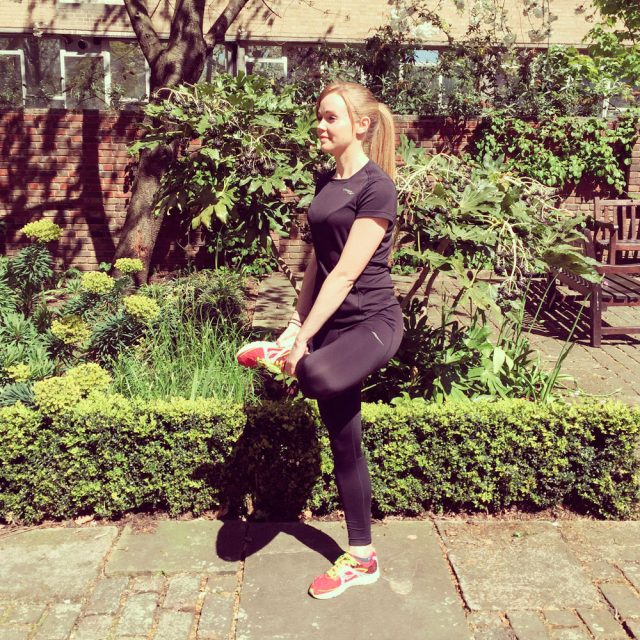
A must for those who suffer with piriformis, runner’s knee, and IT Band issues.
How do you do this stretch before running?
Stand up straight while retaining good posture and balance. Bring your ankle up inverting the foot towards the knee and then the waist. Feel the stretch in the glute and lateral quad area.
How long should this stretch take?
Each movement should take two to three seconds on alternating legs over a 20 metre distance at slow walking pace. Do 3 x sets with a walk back recovery in between.
What is this stretch good for?
This dynamic stretch is great for the glutes, hips, lower back, and lateral quad mobilization. Most runners have been sitting or lying down for hours before they go for a run, making their muscles tight in the glute, lower back, and pelvic areas. This exercise helps to mobilize the glutes and lateral quad areas prior to running.
2. HAMSTRING SWEEP
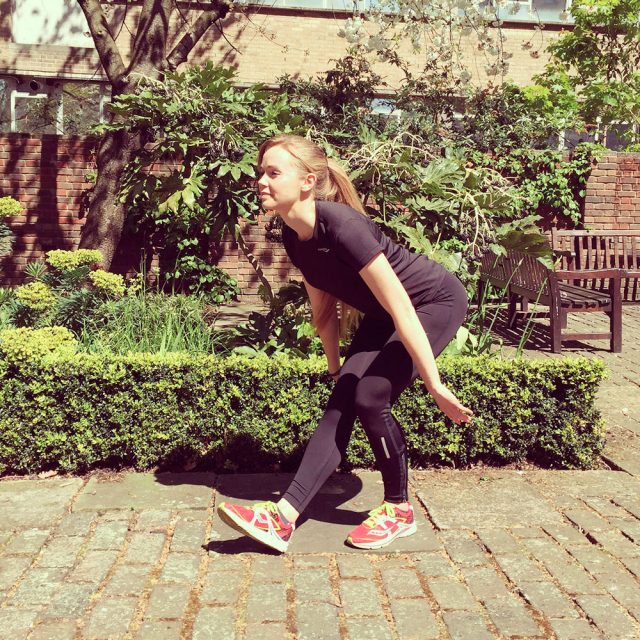
A must for those who suffer with hamstring tightness.
How do you do this stretch before running?
Take a short stride forward keeping the heel firmly on the ground. Keep the front leg straight and bend the back knee sinking your bottom towards the ground as though you’re about to sit in a chair.
At the same time as keeping the front leg straight, sweep down with your hands towards the ground creating a dynamic stretch on the hamstring group.
How long should this stretch take?
Each movement should take two to three seconds on alternating legs over a 20 meter (60 ft.) distance at slow walking pace. Aim to do 3 x sets.
What is this stretch good for?
Hamstring conditioning and flexibility. Conditioning of the hamstring group and long term improvement of flexibility.
3. ANKLING AND CALF MOBILIZATION
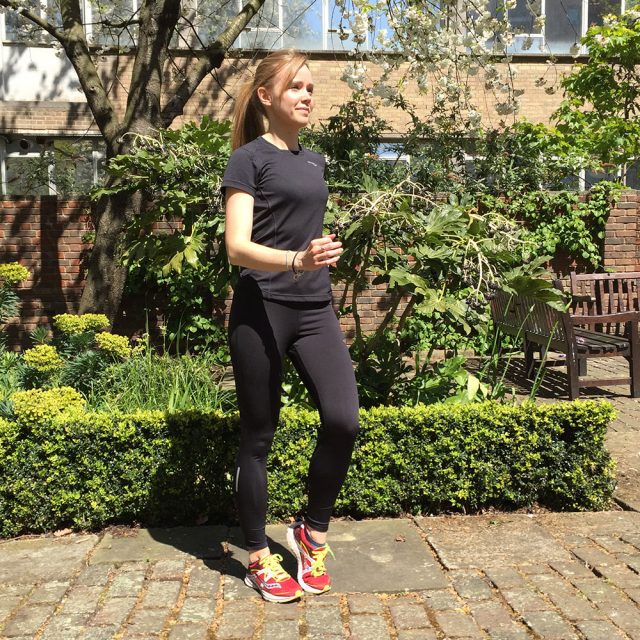
A must for those who suffer from Achilles, calf, plantar fasciitis, and shin issues.
How do you do this stretch before running?
This is an alternative calf raise and lowering drill. The idea is to place the foot on the ground with the toe and the ball of the foot first. Then lower your weight through the foot eventually allowing the heel to return to the ground. Think of it as the opposite to walking, going toe to heel as opposed to heel to toe.
How long should this stretch take?
It should take one to two seconds for each movement alternating on each foot and leg. Aim for 15–30 seconds but pick up the pace and aim to move at a brisk walking speed. Do 3 x sets with a walk back recovery in between.
What is this stretch good for?
Fantastic exercises for Achilles and calf strengthening. Mobilizes and increases flexibility at the same time. This is an absolute must for those who suffer with Achilles, calf, plantar fasciitis, and shin issues.
4. LEG SWINGS: ABDUCTOR & ADDUCTOR
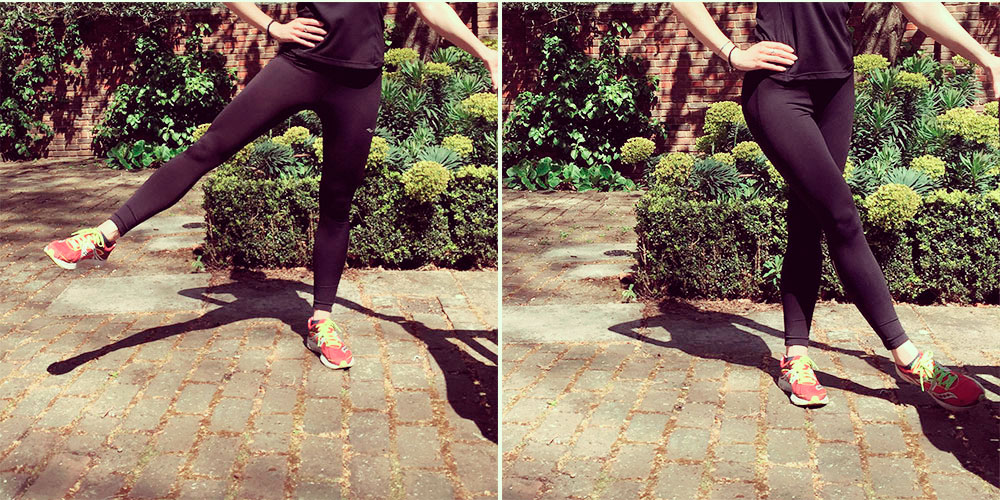
A must for those who suffer from tightness around the abductor/adductor muscle groups.
How do you do this stretch before running?
Keep your trunk and torso strong with good pelvic alignment. Head up and swing one leg across the body to end of range on the medial side and then back across to the lateral side. This movement is controlled and close to one swing per second with no forced effort. Be careful not to rotate the trunk or pelvis.
How long should this stretch take?
Aim to work for 15–20 seconds, then change legs.
What is this stretch good for?
Increased mobility around the abductor/adductor muscle groups along with a stronger core. Increased range of movement (ROM) and dynamic strength.
5. LEG SWINGS: HAMSTRING & HIP FLEXOR
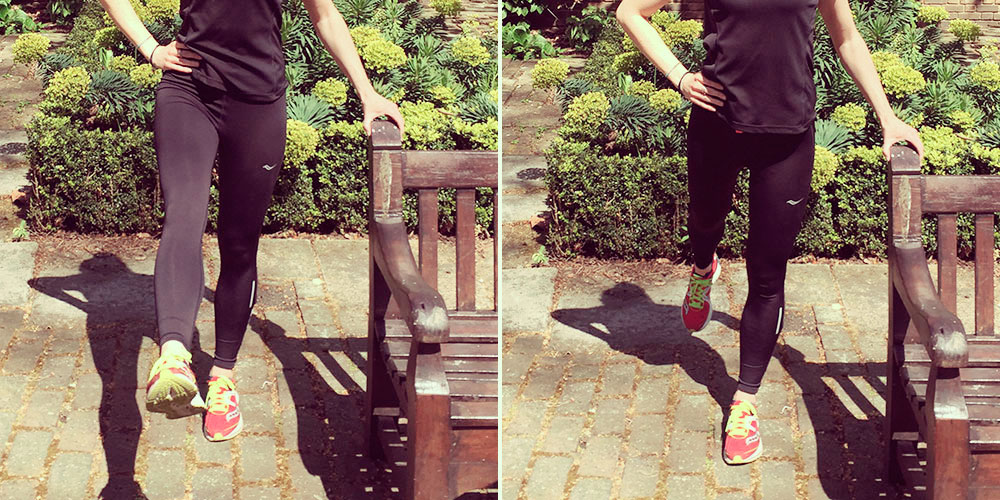
A must for those who suffer from tightness around hamstring and hip flexor muscle groups.
How do you do this stretch before running?
Keep your trunk and torso strong with good pelvic alignment. Head up and swing the leg forwards and backwards engaging the hamstrings and hip flexor groups. Be careful not to lean forward or back keeping the pelvis in a strong and fixed position.
How long should this stretch take?
Aim to work for 15–20 seconds then change legs.
What is this stretch good for?
Increased mobility around the hamstring/hip flexor muscle groups along with a stronger core. Increased range of movement (ROM) and dynamic strength.
If you liked this post, don’t forget to share so that others can find it, too.
Original post at polar.com




